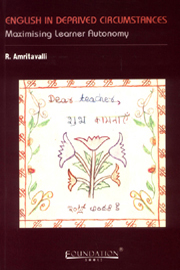2 - The first attempts at autonomous reading: Maximising opportunities for input
Published online by Cambridge University Press: 26 October 2011
Summary
A School for Working Children
The research reported here was for the major part embedded in a natural teaching-learning situation in a school that aimed to integrate first-generation learners into the formal educational system where it could; although this was not its sole perceived goal. This school, and the individual learners who formed a part of this project, are more fully described below. Apart from the prescribed textbook, the materials from which learners could choose their input were mostly provided by me. Beginning with a small central pool that all learners had access to, the compilation grew in response to perceived appropriateness. This pool included books, magazines, newspapers and newspaper supplements, manuals and brochures.
We initially discuss five learners, of whom two had crossed the higher secondary stage of education, and three were judged ready to prepare for the class VII public examination of the state education board; this examination included a paper in English. This sample is supplemented with data from a group of about ten learners starting at a zero level in English. These are longitudinal data with periodic assessment of the level of language input chosen by the learner.
The issues addressed in the project had begun to take shape in June 1997, when I was asked for some “help with English” by Mrs. Janaki N. Iyer, Principal, Ananda Bharati, for two former students of the school.
- Type
- Chapter
- Information
- English in Deprived CircumstancesMaximising Learner Autonomy, pp. 13 - 28Publisher: Foundation BooksPrint publication year: 2007

